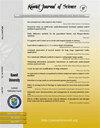Enhancing organic waste management in Ghana through vermicomposting with Eudrilus eugeniae: Implications for sustainable agriculture and waste reduction
IF 1.1
4区 综合性期刊
Q3 MULTIDISCIPLINARY SCIENCES
引用次数: 0
Abstract
Ghana faces considerable challenges in managing municipal solid waste (MSW), with 49 %–68 % of it consisting of organic matter. Vermicomposting, an aerobic composting process employing various species of redworms and earthworms, presents a favourable alternative for managing organic waste. This study aimed to assess earthworms' (Eudrilus eugeniae) capacity to facilitate the natural breakdown and transformation of organic waste, particularly food waste, and to evaluate their positive impact on plant growth. Organic materials such as cassava, plantain, yam, and their peels, including leftovers of fufu, banku, kenkey, and rice, were used for the experiment to ascertain the study objectives. Results indicated a reduction in food waste ranging from 15 % to 50 %, with an average weight loss of 41.8 %. Furthermore, total nitrogen increased from 0.14 % to 0.78 %, available phosphorus from 0.12 % to 0.85 %, and exchangeable potassium from 2.93 % to 3.97 %. The resulting vermicompost was used as a growth medium for tomatoes, and significant differences were observed in shoot length, leaf number, and branch number between treatments. However, no significant difference was found between NPK fertilizer and vermicompost treatments. At four weeks post-transplanting, tomatoes treated with NPK recorded the highest mean shoot length (31 cm), followed by vermicompost (30.13 cm) and the control (27.13 cm). Similarly, tomatoes treated with NPK had the most leaves (51.50), followed by vermicompost (48) and the control (38.75). This study recommends vermicomposting as a viable organic waste management strategy, offering an environmentally friendly alternative to chemical fertilizers. Training and awareness programs should be initiated to promote its adoption in Ghana.
在加纳通过用尤金线虫进行蚯蚓堆肥加强有机废物管理:对可持续农业和减少废物的影响
加纳在管理城市固体废物(MSW)方面面临着相当大的挑战,其中 49%-68% 为有机物。蚯蚓堆肥是一种利用各种红虫和蚯蚓的好氧堆肥过程,是管理有机废物的一种有利选择。这项研究旨在评估蚯蚓(Eudrilus eugeniae)促进有机废物(尤其是厨余)自然分解和转化的能力,并评估其对植物生长的积极影响。为了实现研究目标,实验使用了木薯、车前草、山药及其果皮等有机材料,包括剩菜剩饭。结果表明,食物垃圾减少了 15 % 到 50 %,平均重量减少了 41.8 %。此外,总氮从 0.14 % 增加到 0.78 %,可利用磷从 0.12 % 增加到 0.85 %,可交换钾从 2.93 % 增加到 3.97 %。产生的蛭肥被用作番茄的生长培养基,观察到不同处理之间在芽长、叶片数和分枝数方面存在显著差异。然而,氮磷钾肥料和蛭肥处理之间没有发现明显差异。移栽后四周,施用氮磷钾肥的番茄平均芽长最高(31 厘米),其次是蛭肥处理(30.13 厘米)和对照处理(27.13 厘米)。同样,使用氮磷钾处理的番茄叶片最多(51.50 片),其次是蛭石堆肥(48 片)和对照(38.75 片)。本研究建议将蚯蚓堆肥作为一种可行的有机废物管理策略,为化肥提供一种环保的替代品。应启动培训和提高认识计划,以促进在加纳采用这种方法。
本文章由计算机程序翻译,如有差异,请以英文原文为准。
求助全文
约1分钟内获得全文
求助全文
来源期刊

Kuwait Journal of Science
MULTIDISCIPLINARY SCIENCES-
CiteScore
1.60
自引率
28.60%
发文量
132
期刊介绍:
Kuwait Journal of Science (KJS) is indexed and abstracted by major publishing houses such as Chemical Abstract, Science Citation Index, Current contents, Mathematics Abstract, Micribiological Abstracts etc. KJS publishes peer-review articles in various fields of Science including Mathematics, Computer Science, Physics, Statistics, Biology, Chemistry and Earth & Environmental Sciences. In addition, it also aims to bring the results of scientific research carried out under a variety of intellectual traditions and organizations to the attention of specialized scholarly readership. As such, the publisher expects the submission of original manuscripts which contain analysis and solutions about important theoretical, empirical and normative issues.
 求助内容:
求助内容: 应助结果提醒方式:
应助结果提醒方式:


